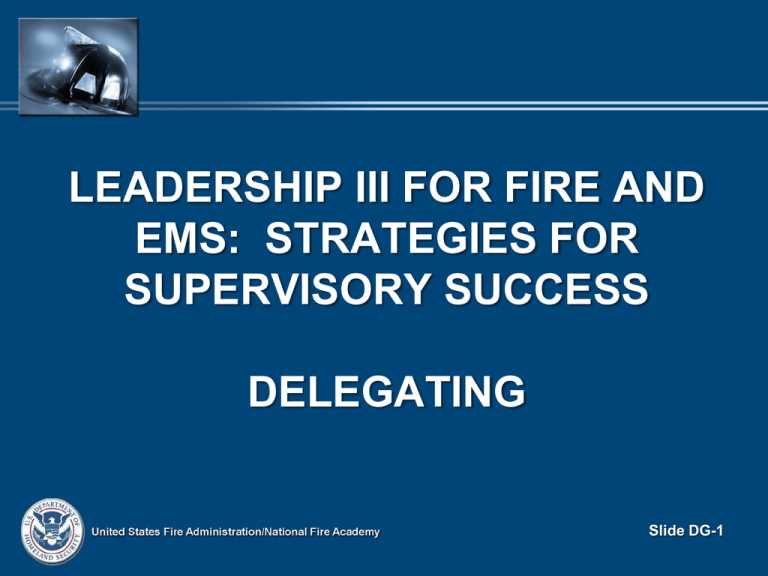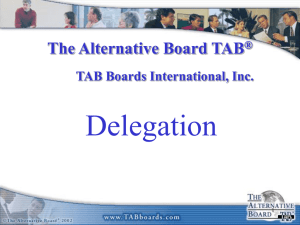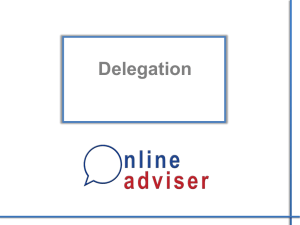LSIII-Delegating
advertisement

LEADERSHIP III FOR FIRE AND EMS: STRATEGIES FOR SUPERVISORY SUCCESS DELEGATING Slide DG-1 OBJECTIVES The students will: • Define delegation. • Identify the benefits derived from effective delegation. • Identify the barriers that prevent effective delegation. • Identify the nine principles of effective delegation. • Identify the consequences of reverse delegation. Slide DG-2 OVERVIEW • • • • • What is Delegation? Benefits of Delegation Barriers to Delegation Principles of Delegation Reverse Delegation Slide DG-3 WHAT IS DELEGATION? Sharing of authority, responsibility, and accountability between two or more people Slide DG-4 AUTHORITY IS THE RIGHT TO MAKE DECISIONS AND TAKE ACTION. Slide D-5 Responsibility is having an obligation to make decisions and take action. Slide DG-6 Accountability is having to answer for results. Slide DG-7 WHAT IS DELEGATION? • Sometimes authority and responsibility are transferred. • More often, specific part of delegator's position is transferred. • Another person assumes responsibility for task(s) assigned to an individual at a higher level. Slide DG-8 What is the definition of leadership? Slide DG-9 WHAT IS DELEGATION? (cont'd) • Relationship to leadership: – Leadership--process of influencing others toward achievement of organizational goals. – Effective leadership requires development of subordinates in order to help them maximize their potential. Slide DG-10 Activity DG.1 Benefits and Barriers Slide DG-11 BENEFITS OF DELEGATION • For the supervisor – More tasks accomplished in less time – Ability to concentrate on more critical tasks – Increased unit morale – Increased unit productivity – More effective leadership – Better time management Slide DG-12 BENEFITS OF DELEGATION (cont'd) • For the subordinate – Opportunity to increase job knowledge – Opportunity to develop leadership/ decisionmaking skills for future leadership roles – Increased motivation – Better understanding of organizational goals – Enhancement of self-confidence, self-esteem, and self-worth Slide DG-13 BENEFITS OF DELEGATION (cont'd) • For the organization – Better time management – More effective use of human resources-better use of talent/skill/ability at all levels – Development of future leaders – Increased organizational effectiveness Slide DG-14 BARRIERS TO DELEGATION • Believing it's wrong to let subordinates do your assigned work • Fear that subordinates will show you up • Believing you can do it better and faster • Lack of confidence in subordinates • Unwillingness to let go of favorite tasks • Fear of losing control • Fear that subordinates will fail and you'll look bad • Lack of self-confidence Slide DG-15 BARRIERS TO DELEGATION (cont'd) • Effective leaders--responsible for getting the job done – Not necessarily doing it all themselves – When job well done, no matter who did it, leader looks good Slide DG-16 BARRIERS TO DELEGATION (cont'd) • Effective leaders-• Effective leaders-committed to understand process maximizing potential of of delegating each subordinate – Basic principles – All tasks are not equal – Minimize risk of – You do things more potential failure often – Increased self– Help subordinates confidence grow Slide DG-17 PRINCIPLES OF DELEGATION • Delegate the right task – Don't delegate: -- Obvious supervisor-to-subordinate responsibilities -- Tasks that involve confidential information -- Tasks that involve great risk -- Tasks that the organization and/or your supervisor expects you to do yourself Slide DG-18 PRINCIPLES OF DELEGATION (cont'd) • Consider delegating tasks: – That are routine – You've been putting off due to lack of time – You've been wrestling with unsuccessfully – Unexpected, unplanned requirement that will interrupt other projects – A "royal headache" for you but will be "fun" for someone else Slide DG-19 PRINCIPLES OF DELEGATION (cont'd) • Use the following process to select the "right" tasks: – List all tasks you presently perform – Evaluate each task for potential delegation based on the criteria provided – Select one or two tasks you are willing to try delegating Slide DG-20 PRINCIPLES OF DELEGATION (cont'd) • Which subordinate is competent? • Is the person ready? • Is the person self-confident enough to assume new responsibilities? • If the task requires working with or leading others, does the person have sufficient credibility? Slide DG-21 PRINCIPLES OF DELEGATION (cont'd) • Define responsibility--what's involved – Clearly define the limits of responsibility being transferred – Make sure the person understands exactly what's involved – Meet up and cover the following Slide DG-22 PRINCIPLES OF DELEGATION (cont'd) • Define the task: specify – Exactly what must be done? – How much? – How well? – When? – Who else? Slide DG-23 SHARING KNOWLEDGE Slide DG-24 PROVISION FOR TRAINING AS APPROPRIATE Slide DG-25 PRINCIPLES OF DELEGATION (cont'd) • Provide necessary information – Background – Why task is necessary – Relevant material – Sources of additional information • Provide or arrange for any necessary training • Emphasize your confidence in the ability to do the delegated task Slide DG-26 PRINCIPLES OF DELEGATION (cont'd) • Delegate authority – Authority makes decisions and takes action – Clearly define limits of authority being transferred – Examples of degree of authority: -- Take action only after clearing with supervisor -- Take action and complete reported action to supervisor -- Take action Slide DG-27 PRINCIPLES OF DELEGATION (cont'd) • Limited to actions/decisions related to delegated task. • Amount of authority must match amount of responsibility. • If delegated task requires the person to interact with/lead others, you must advise them of the delegatee's authority. Slide DG-28 PRINCIPLES OF DELEGATION (cont'd) • Get agreement – Allow subordinate an opportunity to accept or refuse the assignment – Can't force someone to do job outside of their description – Subordinate should want the assignment – Make sure delegatee understands what's involved Slide DG-29 PRINCIPLES OF DELEGATION (cont'd) • Demand accountability – Having to answer for results – Final product must be evaluated against expected results – Make sure each person knows what they are accountable for Slide DG-30 PRINCIPLES OF DELEGATION (cont'd) • Establish feedback mechanisms – Milestone dates – Check-ins – Frequency of feedback determined by: -- Complexity -- Importance -- Confidence – Supervisor needs to strike a balance Slide DG-31 SUPERVISORY RETREAT Slide DG-32 PRINCIPLES OF DELEGATION (cont'd) • Provide for emergencies – Supervisor must "let go" – Avoid tendency to "jump in and take over" – Allow subordinate to correct mistakes without interference – Subordinate may approach task in different way – "Let go," but don't "drop out" completely – Minimal supervision with "open door" policy Slide DG-33 LEAVING SUBORDINATES ALONE Slide DG-34 TOLERATING DIFFERENCES Slide DG-35 SHOWING INTEREST WITHOUT NOSINESS Slide DG-36 REWARDING A JOB WELL DONE Slide DG-37 PRINCIPLES OF DELEGATION (cont'd) • Reward accomplishments – Provide positive reinforcement – Reward for final products that meet or exceed criteria established at time of initial delegation – Provide constructive feedback if final product failed to meet performance criteria – Solicit feedback from subordinate on the total delegation process Slide DG-38 Activity DG.2 Evaluating the Delegating Process Slide DG-39 REVERSE DELEGATION • Occurs when a supervisor accepts responsibility for a task that rightfully belongs to a subordinate. – Going up, instead of down. – Subordinate cleverly manipulates supervisor. Slide DG-40 REVERSE DELEGATION (cont'd) • Consequences of reverse delegation – Takes time away from tasks supervisor is required to do – Rewards subordinate for unacceptable performance – Reduces supervisor's leadership credibility – Prevents subordinate growth and development Slide DG-41 REVERSE DELEGATION (cont'd) • How to avoid – When a subordinate does a task incorrectly, provide feedback and/or training as needed, but give it back for revision. – If a subordinate comes to you for help, give whatever help is required, but don't just do the job yourself. – Always be available for help and support, but refuse to accept ownership of subordinate tasks. Slide DG-42 SUMMARY • Principles of delegation process • Taking the first step – Success depends on: -- Knowing yourself -- Knowing your subordinates -- Following the basic rules -- Taking your time -- Believing you can do it Slide DG-43 SUMMARY (cont'd) • The payoff – Supervisor and subordinates grow. – Morale and profitability increase. Slide DG-44









